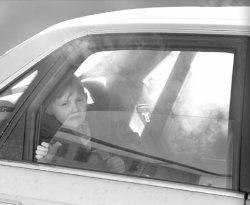 Last updated: March 24, 2010
Last updated: March 24, 2010
Source: BBC News
Smoking should be banned in all cars as well as in public places where young people congregate, doctors are urging.
The Royal College of Physicians wants England’s imminent review of anti-smoking laws to consider such measures to protect the young.
It says passive smoking results in 300,000 extra child visits to GPs in the UK every year for problems such as asthma and bacterial meningitis.
But driving and smoking lobby groups say cars are a “private space”.
Wheezing
A number of medical bodies have supported a ban on smoking in cars transporting children, but the RCP goes a significant step further, urging a blanket ban on anyone lighting up in a vehicle – regardless of whether children or indeed any other passengers are inside.
“ This report isn’t just about protecting children from passive smoking, it’s about taking smoking completely out of children’s lives ”
Professor John Britton RCP
It is calling for a two-pronged approach which would see children protected from second-hand smoke and shielded from the sight of adults smoking – whether in the playground or on the TV.
The RCP’s report – Passive Smoking and Children – is being released ahead of the three-year review of the ban on smoking in enclosed public spaces in England. Similar bans have been introduced across the UK, with Scotland having led the way.
Drawing on a series of studies, the report suggests that in the UK, tens of thousands of youngsters are falling ill as a result of exposure to cigarette smoke.
Exclusion zones
These calculations include 20,000 chest infections, some 22,000 new cases of asthma and wheezing, as well as 200 cases of bacterial meningitis and 40 cases of Sudden Infant Death Syndrome – or cot death.
Each year it claims these account for more than 300,000 visits to a GP – some of which end up in hospital – costing the NHS £23.3m.
“ The car is a private space and it crosses a line to start interfering in it, however much one disapproves of smoking ”
Nigel Humphries Association of British Drivers
The report does concede that these figures are only estimates, but says it is confident they give an “indication” of the number of children who become ill.
The doctors acknowledge that a ban on smoking in the home, however desirable it believes this to be, would be neither politically or practically possible, but sees the car as an intervention in the private sphere which the public would tolerate.
But it argues that the only way to make it practically enforceable would be to introduce it as a blanket ban on all private vehicles – regardless of their passengers, as exemptions would prove too complex.
In addition, it wants to see smoking banned in places frequented by children, such as parks and outdoor swimming pools – and exclusion zones outside school gates.
Campaigns to explain to parents the importance of a smoke-free home, price hikes and generic cigarette packaging are also among the recommendations issued.
“This report isn’t just about protecting children from passive smoking, it’s about taking smoking completely out of children’s lives,” says Professor John Britton, head of the college’s Tobacco Advisory Group and lead author of the report.
Parental responsibility
A Department of Health spokesman stressed the role that anti-smoking legislation had played in curbing exposure, but added: “The government is looking at ways to go further to reduce the 9,500 children admitted to hospital every year as a direct result of exposure to second-hand tobacco smoke.
“Parents have a responsibility to protect their children by stopping smoking around them in enclosed spaces like their cars and in their homes.”
The Welsh Assembly Government said it had commissioned a tobacco control group to advise specifically on how to protect children, while a Scottish Government spokeswoman said it was conscious smoking in cars was a source of exposure that needed highlighting but had no plans for a ban. Northern Ireland is to conduct its own review.
The driving and smoking lobby groups expressed their anger at the recommendations, arguing that adults did not needs laws regulating every aspect of their behaviour.
Simon Clark, of Forest, which campaigns for smokers’ rights, questioned the figures used in the report, noting that cases of asthma had been rising as the number of smokers had fallen.
“It’s unacceptable to single out smokers and imply that they are solely responsible for the cost of asthma treatments, hospital admissions and asthma drugs for children up to the age of 16.
“We want smokers to be considerate towards those around them, especially children, but changing people’s behaviour should be achieved by education and encouragement not by legislation and enforcement.”
Nigel Humphries, spokesman for the Association of British Drivers, said the car should be seen as an extension of the home and treated as such.
“The car is a private space and it crosses a line to start interfering in it, however much one disapproves of smoking.”
Written by Clare Murphy



